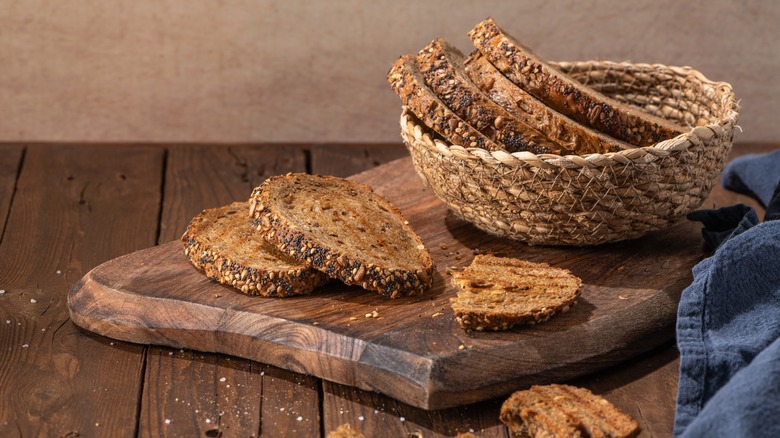
The Type Of Bread That Has More Protein Than An Egg – Health Digest
Eggs can be a great way to start your day with a bit of protein to help you feel full until lunch. It’s also a good idea to get about 15 to 30 grams of protein at each meal rather than reserve your high-protein foods until later in the day. Because one egg has 6 grams of protein, you might fall short of your protein needs if this is your only protein source. Adding bacon or sausage only adds unhealthy saturated fat, and processed meats like these are linked to cancer, heart disease, and diabetes.
The type of bread you choose can help you meet your protein needs without adding saturated fat. Rather than searching for this bread in the bread aisle, head to the freezer section for the healthiest kind of bread – sprouted grain bread. Two slices of sprouted wheat bread provide 10 grams of protein and 4 grams of fiber. What you won’t see in sprouted bread is fat, and most of these breads have little sugar.
Sprouted grain bread has more protein than regular bread because the sprouting process boosts the amount and availability of the amino acids in the grain. Compared to other breads, sprouted grain breads also make more minerals and antioxidants available for your body.
The nutrients of sprouted grain bread
Sprouted grain bread is a little more expensive than regular bread because the sprouting process increases the cost of production. First, you must soak the grains in water and then store them for several days until they begin to sprout. According to a 2021 review in Food Science and Nutrition, this germination process changes the nutritional profile of the grains and makes nutrients more available for your body to absorb.
Depending on the type of sprouted grain, you could see up to a 10% boost in protein per gram, and this protein is more easily digestible. Enzymes break down the fats in the grains during the sprouting process to serve as an energy source for the growing plant. That means sprouted grains will have a lower fat content.
Many plant-based foods, including whole grains, have phytate that can block your body’s absorption of important nutrients. When grains are sprouted, the phytate is broken down. The availability of minerals like calcium, iron, and zinc can increase by up to 90% depending on the type of grain and the sprouting process. Sprouted grains also have flavonoids such as kaempferol, quercetin, and luteolin that help your body fight free radicals that lead to chronic disease.
Sprouted grain is a healthier option
Two slices of sprouted grain bread won’t save you many calories compared to white or wheat bread – only about 15 calories, but you’ll get almost twice the protein and fiber with less sugar. Sprouted wheat bread also provides twice the potassium to help manage your blood pressure (you could eat these foods if you need more potassium). Zinc, magnesium, and selenium are also higher in sprouted grain compared to white and wheat bread.
The nutritional composition of sprouted grain bread can vary depending on the type of grains used. Some sprouted grain breads like Food for Life’s Ezekiel 4:9 Sprouted Whole Grain Bread include sprouted wheat, barley, millet, and spelt, but also contain sprouted lentils and soybeans. This grain and rice combo makes Ezekiel Bread a complete protein, meaning that it contains all nine essential amino acids that your body needs and cannot make on its own. Ezekiel bread is also flourless and low glycemic, which makes it good for people with diabetes.





